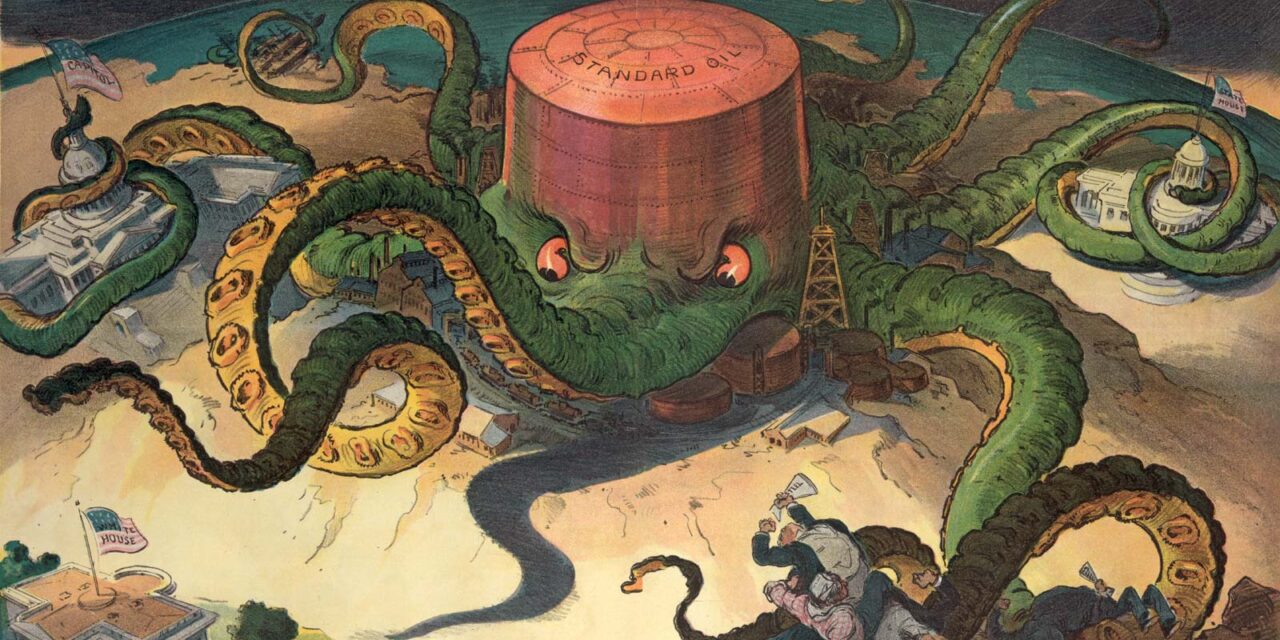No, this article is not about “Progressive Muslims” specifically, but some of the following certainly applies to them.
The vast majority of us are, knowingly or unknowingly, progressivists. What I mean by this is that we view ourselves and the present age as, historically, the latest and greatest. The question is, are we justified in believing this?
The way I use the term, “progressivism” is the broad philosophy that humanity is on a perpetual path of progress. As human civilization advances through time, it gradually improves on the intellectual and moral plane as our knowledge of the world around us increases. Sure, there might be setbacks here and there (e.g., world wars, genocide, etc.), but the overwhelming trend is that of advancement.
Intellectual and Moral Advance
Progressivism finds its origins in the Enlightenment and its peak in the widespread acceptance of Darwinism in the 20th century, which gave progress to its first scientific expression. Thinkers as influential and diverse as Locke, Descartes, Kant, Hegel, and Marx all propounded on the power of human rationality to overcome the baseness of human nature and continue to propel mankind to a shining destiny of his own choosing.
According to such views, not only are humans, as a race, increasing in knowledge of the empirical world — chiefly through science — but, also, they are advancing in moral rectitude. The barbarism of the past is seen for what it was. Religious self-determination, freedom of conscience, inalienable rights, women’s rights, and a whole slew of other humanist liberal doctrines have developed, each sounding a drumbeat in the march toward ultimate human actualization.
Are We Living in the Best of Times?
Of course, there have also been skeptics of this kind of progressivism. The most prominent strand of critique reasons that modern man, living in a primarily global capitalist technocratic world, is clearly not better off than certain of his predecessors. Industrialized capitalism, for all its technical achievement, has struck a weighty blow against the health of the planet. And liberal democracy, for all its aspirations of justice and equality, has written cheques the modern nation-state, with its tendencies for corruption and violence, can’t cash. As for Darwinism, its application to sociology and social engineering in the early 20th century and beyond has had less than stellar results. Reviewing these examples and others, there is good reason to think that, rather than progressing, in fact, the human race is on a fast decline.
Outlining a Critique
As a critic of progressivism myself, I prefer a different approach. While it is helpful to point out the glaring problems plaguing the modern world, this line of critique does not address the central premise of progressivism, which is that, as time moves on, human knowledge accumulates.
A progressivist, for example, might argue that all the ills of the modern world only represent the imperfect implementation of the otherwise venerable values developed through the centuries. For example, technology may be used by ill-intentioned actors to engineer weapons of mass destruction while others invent new medical procedures to save lives. The existence of individuals who would misuse advanced technology for nefarious ends does not take away from the fact that human knowledge has progressed in an estimable way. Same with capitalism, democracy, and other institutions and values.
Does Human Knowledge Accumulate?
What I would like to suggest, however, is that human knowledge does not accumulate. This might seem like a dubious claim, especially in light of technology and science. Clearly, technologically speaking, we are light years ahead of our ancestors, right? In any case, I will not introduce the entirety of the argument and its considerations now, but, what I would like to share are a few reasons why we should revisit and, perhaps, be skeptical of the notion that knowledge accumulates throughout history.
The point of all this is that, if we do away with the idea that human knowledge accumulates, then this has a host of implications, chief among them this: If knowledge does not accumulate, to what can we attribute the “amazing triumphs” of the modern age, with all our technology and human rights? Is it not curious that in the past 150 years humans have seemingly been able to accomplish more than was done in 5000 years of human history combined?
Knowledge of Knowledge
So, how are we in a position to judge whether knowledge has accumulated or not? Obviously, we cannot survey all of human history and plot the cumulative amount of knowledge in a given period in order to produce a clean line graph illustrating progress.

Given our limited perspective from which to adjudicate, what other reasons would we have to think that knowledge accumulates?
In actuality, there are 5 major reason why we should be skeptical that knowledge accumulates from one millennium to the next.
1. Non-Factual Knowledge
I think that most people implicitly conceptualize “knowledge” as a collection of facts. If knowledge is merely a set of facts, then it serves to reason that new facts are continually discovered, faithfully recorded, and aggregated into the collective, much like adding a new book to a cavernous library.
But this is an exceedingly naive theory of knowledge. A large portion of our knowledge, for example, is practical, i.e., how-to knowledge. Knowing how to, for example, drive a car or play a musical instrument cannot be fully expressed as a set of facts. When it comes to human ethical standards, social conventions, and aesthetic standards, much of a person’s knowledge is either know-how or tacit or both.
As for tacit knowledge, even knowledge that can be expressed factually (or propositionally), we often leave unsaid. In our day to day living, for example, we all rely on massive amounts of tacit knowledge to navigate life successfully but would be hard pressed to verbalize even a small fraction of that knowledge.
Since practical and tacit knowledge are unexpressed, it is often impossible to pass on that knowledge to others via writing. Of course, a crucial part of our being able to accumulate knowledge is the ability to record that knowledge. Because of this, practical and tacit knowledge are left, for the most part, unrecorded and, thus, go unaccumulated.
(If you have spent any time with the elderly, you often hear them bemoan how newer generations have lost much practical knowledge and are ignorant of the “art of living,” lack “common-sense,” etc. Rather than taking them to be merely cantankerous, perhaps there is something deeper about these complaints.)
2. Context Dependence
As a college student, I would sometimes study in the math department library. If curiosity got the better of me, I would take a book off the shelf and flip through the pages. The graduate level math books might as well have been written in ancient Cuneiform. There is no way I could ever understand a single page of Lie Algebra or Complex Analysis without extensive, hands-on instruction from qualified mathematics instructors.
The point is, it is difficult to isolate knowledge outside the context of a lived discourse. Text on a page, for example, is not knowledge if there is no one available to understand it. If we go back to the example of advanced mathematics, consider all the instruction and institutions and processes and facilitation that has to go into training a single individual — i.e., the math student — to be able to merely understand those math texts. In other words, the text by itself cannot convey knowledge. Given this, why should we even suppose that knowledge can be localized within a text? In reality, knowledge is a much broader phenomenon that cannot be reified into an easily consumable, transferable object.
So, if we wanted to make sure knowledge of Lie Algebra was preserved for the next 500 years, our task would not be as simple as preserving a book or series of books on the subject. To preserve the knowledge, we would have to maintain math institutions, math instruction, and a sufficient amount of the discourse for 500 years. Not a straightforward, easily accomplished task.
3. Cultural Attitudes
We cannot expect that all past cultures and civilizations had the desire to record and preserve their factual knowledge for the benefit of humans far into the future. The idea that knowledge itself is salvific and ought to be propagated for the benefit of mankind as a whole is inherently a religious notion, mostly associated with the Abrahamic faiths. Why go through the laborious task of preserving your best ideas and pieces of knowledge for people of the future (assuming you believe, in the first place, that there will be some continuity of life in the future with people who will benefit from that knowledge — an assumption not shared by many cultures)?
Out of those cultures that did believe in the importance of preserving knowledge, how many also used recording methods we would be able to use (or recognize) today? For example, how accessible to us are the oral traditions of the Bo tribe of the Andaman islands? Probably not very accessible considering the tribe recently became extinct and no one is left that can speak their language.
4. Recording Technology
Even if we assume that a past civilization possessed a sizable amount of factual knowledge AND that knowledge was not highly context dependent AND that civilization believed it important to record and preserve that knowledge beyond the foreseeable future, the practical problem would remain of how to record that knowledge. As it turns out, paper is not that durable. Neither are animal hides, papyrus, even solid stone has its limitations. Modern technology does not fare much better, as anyone who has lost a file or two (or three) due to a faulty hard drive can attest.
Historically, many major libraries, archiving the invaluable works of the past, have unceremoniously burned to the ground. In the modern age, the written word may be somewhat more durable, where information is stored in “the cloud.” But, there are serious risks involved in relying on electronic data storage, not to mention the energy costs associated with the perpetual operation of data servers. And it is yet to be seen how much of today’s electronic information can be sustained 50, 100, 300, or 1000 years into the future. Only time will tell.
The low fidelity of materials like paper or papyrus are undoubtedly a major part of the reason we have very limited textual artifacts from past civilizations. We cannot even estimate how much information and potential knowledge from literally millennia of human history have been lost.
5. Interpreting the Past
This goes back to context dependence, but how do we interpret the limited amount of materials that we do have from past civilizations? It is more than a little difficult to translate ancient, extinct languages. Even when the language in question can be translated, making sense of the text becomes a major challenge of its own.
To better appreciate this point, consider the fascinating history of the Human Interference Task Force. In 1981, the US Department of Energy assembled a task force of scientists, anthropologists, and sociologists to tackle a very specific problem. The issue was that the US stores tons of toxic nuclear waste in the Yucca Mountains and other contained locations. Due to the nature of nuclear waste, the area will pose extreme danger to human life thousands of years into the future. How is it possible to warn future generations about this danger and to stay away? How can we communicate with people 10,000 or 100,000 years into the future?
You can read more about the challenges the Task Force faced here and here. The Wikipedia entry lists some of the more interesting ideas, e.g., creating an “atomic priesthood” that could become a religion with prohibitions like “never trespass in this area,” breeding genetically modified cats that change color whenever they go near nuclear radiation thus serving as a warning, etc. The Taskforce considered different monuments that could communicate danger and warning as well:


The obvious problem the task force faced is that, for the “warning” to be heeded, it would have to be conspicuous. But the more conspicuous the warning, the more attention it would attract from future archaeologists, who would want to study and excavate the area much like archaeologists do today. As one blogger put it, “If we showed sick people, how would they know it’s a helpful warning and not just an ancient superstitious curse? Think of how effective [depictions of] the pharoahs’ curses were at deterring [Egyptologists].”
Now, given such difficulties, think about how difficult it would be to understand material from past people of only 1,000 or 3,000 years ago, people that, most likely, were not even deliberately trying to communicate with us.
For example, Egyptologists have catalogued plenty of ancient hieroglyphic text. Some of those texts are perhaps more lucid than others. When interpretation becomes difficult, though, what resources can an interpreter rely on?
Consider the “Eye of Horus,” a symbol found in many Egyptian archaeological artifacts. Egyptologists understand it as a symbol of power and good fortune, a personification of a certain goddess, and they entertain many other mythological theories about the significance of this text.
The interesting question is: What if such theories are all wrong, and we are way off base when it comes to understanding the intended meaning of the ancient scribes? What if there is nothing mythological about the Eye of Horus? What if the ancient Egyptians were recording important pieces of knowledge, or recording important pieces of knowledge through mythological images, or something else entirely? We are completely unable to make those kinds of distinctions, but, rightly or wrongly, few would think that there is some valuable piece of knowledge the Egyptians recorded in stone that people today can utilize toward beneficial ends. The point is, even if those hieroglyphs contain some knowledge that could contribute to the accumulation of total human knowledge, we in present times would not be able to see that.
Conclusion
If knowledge does not accumulate, what does that mean? I believe there are wide ranging implications. For one, without knowledge accumulation, it is hard to understand what progressivism could even mean.
Furthermore, as mentioned earlier, if knowledge does not accumulate, to what can we attribute all modern “technological and moral advancement”?
Let’s put it this way: If you are a progressivist, believing that the modern age is somehow unique in its advancement vis-a-vis past peoples, you must explain why this advancement only shows up in the last 150 years. What about the other 4850 years of human civilization? Why has no one else experienced the “wonders” of the modern age? The way I see it, there are only 2 possibilities.
1. Knowledge accumulates over time such that the present age is always the most advanced. As we have seen, this is not tenable.
2. Chronocentrism: the view that modern people are, as a matter of brute fact, inherently more intelligent and moral than people of the past. We’re just special and unique! Obviously, chronocentrism is as academically defensible as ethnocentrism.
So there is no viable explanation for progressivism. Either we are the most intellectually and morally advanced age of humanity to have ever lived, or we are not. If we are, we have no good explanation why. If we are not, who is and what possible evidence is there of their advancement (especially given point 5 above)?
For our purposes in this article, I am not advancing a claim as to whether or not our age is the most advanced historically. I am merely pointing out the extent of our ignorance.
But…
But, come on! Are we seriously going to question whether civilization today is more advanced than it was 2000 or 3000 years ago? That’s ludicrous!
Well, for virtually any example you can give of modern day advancement and the lack thereof in the past, one can ask, “How do you know?” How do you know people in the distant past, across thousands of cultures and languages and geographies and time periods, were relatively incompetent when it came to medicine or health or education or governance or commerce or travel, etc.? Coupled with the fact that most of our impressions of the past are incorrigibly colored by progressivism in the first place, this makes judgments of relative advancement virtually impossible.
Written by Daniel Haqiqatjou







Recent Comments